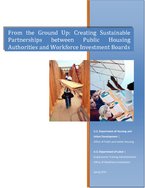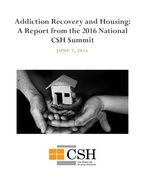0
Publication
Community:
Dec 14, 2018
Health and reentry are closely related, and chronic medical, mental health, and substance use problems make it harder for newly released people to seek employment, obtain housing, and avoid reincarceration. Compared with the general population, justice-involved people tend to be in poorer health and need access to physical and behavioral health services, as well as the know-how and motivation to get care.
Authored by: Rochisa Shukla and Kamala Mallik-Kane for Urban Institute
Topics: Affordable Care Act, Criminal justice, Health, Legislation & Policy, Low-income, Medicaid / Medicare, Research, Stability
 Shared by Mica O'Brien
Shared by Mica O'Brien
Mica O'Brien posted a
on Dec 14, 2018
Rochisa Shukla and Kamala Mallik-Kane for Urban Institute
Health and reentry are closely related, and chronic medical, mental health, and substance use problems make it harder for newly released people to seek employment, obtain housing, and avoid reincarceration.
0
Publication
Community:
Dec 6, 2018
When we refer to people who are, or have been, in contact with the criminal justice system as “felons,” “offenders,” “inmates,” or “convicts,” we define them by the worst act of their lives, creating a stigma that lingers long after they’ve paid their debt to society. If we are serious about removing barriers for people with felony convictions, we must change the words we use to describe them.
Authored by: Cameron Okeke and Nancy G. La Vigne for The Urban Institute
Topics: Criminal justice, Legislation & Policy, Racial inequalities
 Shared by Mica O'Brien
Shared by Mica O'Brien
Mica O'Brien posted a
on Dec 6, 2018
Cameron Okeke and Nancy G. La Vigne for The Urban Institute
When we refer to people who are, or have been, in contact with the criminal justice system as “felons,” “offenders,” “inmates,” or “convicts,” we define them by the worst act of their lives, creating a stigma that lingers long after they’ve paid their debt to society.
0
Report
Community:
May 1, 2018
The Enhanced Transitional Jobs Demonstration (ETJD), funded by the Employment and Training Administration of the U.S. Department of Labor, tested seven transitional jobs programs that targeted people recently released from prison or low-income parents who had fallen behind in child support payments.
Authored by: MDRC, OPRE, and Employment and Training Demonstration
Topics: Asset building, Cost effectiveness, Criminal justice, Legislation & Policy, Low-income, Research, Stability, Workforce development, Youth
 Shared by Mica O'Brien
Shared by Mica O'Brien
Mica O'Brien posted a
on Nov 19, 2018
MDRC, OPRE, and Employment and Training Demonstration
The Enhanced Transitional Jobs Demonstration (ETJD), funded by the Employment and Training Administration of the U.S.
0
Case study
Community:
Sep 25, 2018
Practitioners working on community safety have increasingly incorporated creative placemaking techniques into their work. Creative placemaking refers to the ways in which arts and culture change how people use the places they share.
Authored by: Mark Treskon for Urban Institute
Topics: Community development, Criminal justice, Low-income, Out-of-school time, Partnerships, Place-based
 Shared by Mica O'Brien
Shared by Mica O'Brien
Mica O'Brien posted a
on Oct 10, 2018
Mark Treskon for Urban Institute
Practitioners working on community safety have increasingly incorporated creative placemaking techniques into their work. Creative placemaking refers to the ways in which arts and culture change how people use the places they share.
0
News Article
Community:
Oct 1, 2018
Some places lift children out of poverty. Others trap them there. Now cities are trying to do something about the difference.
Authored by: Emily Badger and Quoctrung Bui for The New York Times
Topics: Child welfare, CLPHA, Community development, Criminal justice, Housing, Low-income, Metrics, Mobility, Racial inequalities, Research, Stability, Youth
 Shared by Mica O'Brien
Shared by Mica O'Brien
Mica O'Brien posted a
on Oct 1, 2018
Emily Badger and Quoctrung Bui for The New York Times
Some places lift children out of poverty. Others trap them there. Now cities are trying to do something about the difference.
0
Publication
Community:
Jul 27, 2018
On January 1, 2014, in states that have chosen to expand Medicaid eligibility under the Affordable Care Act, nearly all chronically homeless people who lacked health insurance became eligible for Medicaid. This Primer offers state Medicaid officials and other interested parties strategies for using Medicaid to meet the needs of this very vulnerable population--some strategies that have succeeded in the past and some that are emerging under provisions of the Affordable Care Act.
Authored by:
Topics: Affordable Care Act, Criminal justice, Disabilities, Dual-eligibles, Funding, Health, Homelessness, Housing, Low-income, Medicaid / Medicare, Mental health, Partnerships, Stability, Substance abuse, Supportive housing
 Shared by Housing Is
Shared by Housing Is
Housing Is posted a
on Jul 27, 2018
On January 1, 2014, in states that have chosen to expand Medicaid eligibility under the Affordable Care Act, nearly all chronically homeless people who lacked health insurance became eligible for Medicaid.
0
Publication
Community:
Jul 23, 2018
Part of New York State’s Homelessness Action Plan includes an investment of new supportive housing resources and services over the next five years to address vulnerable populations experiencing homelessness. Therefore, the availability of and access to various support services such as employment and training opportunities, parenting, counseling, independent living skills training, primary healthcare, substance disorder treatment and mental health care, child care, and benefits advocacy are critical components of any project funded under this plan.
Authored by:
Topics: Cost effectiveness, Criminal justice, Disabilities, Domestic violence, Foster care, Funding, Homelessness, Housing, Medicaid / Medicare, Mental health, Substance abuse, Supportive housing, Youth
 Shared by Housing Is
Shared by Housing Is
Housing Is posted a
on Jul 23, 2018
Part of New York State’s Homelessness Action Plan includes an investment of new supportive housing resources and services over the next five years to address vulnerable populations experiencing homelessness.
0
Publication
Community:
Jul 19, 2018
Assisting public housing residents on the path towards self-sufficiency requires going beyond providing decent, safe, and affordable housing. Public housing residents may face barriers to employment, such as limited education, job skills and/or proficiency in the English language. This toolkit is a resource for both frontline staff and management. It offers examples of how partnerships between DOL and HUD can increase public housing resident employment and create mutual benefit for both agencies.
Authored by:
Topics: Criminal justice, Disabilities, Funding, Housing, Legislation & Policy, Low-income, MTW, Partnerships, Workforce development
 Shared by Housing Is
Shared by Housing Is
Housing Is posted a
on Jul 19, 2018
Assisting public housing residents on the path towards self-sufficiency requires going beyond providing decent, safe, and affordable housing. Public housing residents may face barriers to employment, such as limited education, job skills and/or proficiency in the English language.
0
Report
Community:
Jul 19, 2018
As prospects seem to diminish for the next generation being
better off than the current one, it is essential to elevate the
successful work being done to address intergenerational
poverty and create an intergenerational path of opportunity.
Practical State Solutions profiles effective solutions from Ascend
partners throughout the United States and the work driven by
leaders in Colorado, Connecticut, Florida, Georgia, Maryland,
Minnesota, Tennessee, and Utah. It contains recommendations
on processes that lead to better outcomes for families, lessons
learned on engaging and bringing families to the table as
empowered experts, and information on how to move to
the next level whether you are starting your 2Gen journey or
working to go deeper.
Authored by:
Topics: Asset building, Child welfare, Criminal justice, Dual-generation, Early childhood, Family engagement, Funding, Health, Legislation & Policy, Post-secondary, Workforce development
 Shared by Housing Is
Shared by Housing Is
Housing Is posted a
on Jul 19, 2018
As prospects seem to diminish for the next generation being
better off than the current one, it is essential to elevate the
successful work being done to address intergenerational
poverty and create an intergenerational path of opportunity.
Practical State Solutions profiles effective solutions from
0
Publication
Community:
Jul 19, 2018
Young adults ages 18-24 require specific, targeted services and interventions from the juvenile justice and homelessness service providers with whom they interact if they are to achieve successful outcomes and avoid longterm harms. This resource is intended to assist policymakers, practitioners, and other stakeholders in applying an earlier report, “Addressing the Intersections of Juvenile Justice Involvement and Youth Homelessness: Principles for Change.” in their work with and on behalf of young people in this age group
who are under the jurisdiction of the juvenile justice system.
Authored by:
Topics: Criminal justice, Homelessness, Partnerships, Racial inequalities, Youth
 Shared by Housing Is
Shared by Housing Is
Housing Is posted a
on Jul 19, 2018
Young adults ages 18-24 require specific, targeted services and interventions from the juvenile justice and homelessness service providers with whom they interact if they are to achieve successful outcomes and avoid longterm harms.
0
Policy Brief
Community:
Jul 17, 2018
The Denver Social Impact Bond program is an initiative aimed at measurably improving the lives of people most in need by driving resources towards better, more effective programs. Social Impact Bonds are a unique type of performance-based contract where private and/or philanthropic lenders loan funds to accomplish a specific objective and are repaid based on whether the program achieves its goals. Denver’s Social Impact Bond program will use funds from lenders to provide housing and supportive case management services to at least 250 homeless individuals who frequently use the city’s emergency services, including police, jail, the courts and emergency rooms.
Authored by:
Topics: Community development, Cost effectiveness, Criminal justice, Health, Homelessness, Housing, Low-income, Mental health, Partnerships, Stability, Substance abuse, West Coast
 Shared by Housing Is
Shared by Housing Is
Housing Is posted a
on Jul 17, 2018
The Denver Social Impact Bond program is an initiative aimed at measurably improving the lives of people most in need by driving resources towards better, more effective programs.
0
Publication
Community:
Jul 13, 2018
Recognizing the layers to developing a health and housing partnership, this Literature Review and Resource Bank is intended to provide background and data resources that can be used in grant applications or in conversations with potential funders in the effort to foster new health and supportive housing partnerships.
Authored by:
Topics: Cost effectiveness, Criminal justice, Data sharing, Dual-eligibles, Funding, Health, Homelessness, Housing, Low-income, Medicaid / Medicare, Mental health, Partnerships, Post-secondary, Preventative care, Research, Seniors, Substance abuse, Supportive housing, Youth
 Shared by Housing Is
Shared by Housing Is
Housing Is posted a
on Jul 13, 2018
Recognizing the layers to developing a health and housing partnership, this Literature Review and Resource Bank is intended to provide background and data resources that can be used in grant applications or in conversations with potential funders in the effort to foster new health and supportive hou
0
Report
Community:
Jul 12, 2018
On June 7, 2016 CSH invited a diverse group of national experts from the housing, homeless prevention, Substance Use Disorder (SUD) treatment, mental health, criminal justice and recovery fields for a special meeting on the topic of addiction recovery and housing. The primary goal of the convening was to engage participants in a thoughtful discussion around how CSH can work with our national and local partners to promote recovery in supportive housing and ensure that supportive housing is part of the continuum of recovery supports available for people living with addiction.
Authored by:
Topics: Criminal justice, Dual-eligibles, Health, Homelessness, Housing, Legislation & Policy, Mental health, Partnerships, Substance abuse, Supportive housing
 Shared by Housing Is
Shared by Housing Is
Housing Is posted a
on Jul 12, 2018
On June 7, 2016 CSH invited a diverse group of national experts from the housing, homeless prevention, Substance Use Disorder (SUD) treatment, mental health, criminal justice and recovery fields for a special meeting on the topic of addiction recovery and housing.
0
Policy Brief
Community:
Jul 10, 2018
This brief explores how state Medicaid agencies have utilized a variety of federal authorities and delivery systems to increase access to supportive housing services and highlights important implementation considerations.
Authored by:
Topics: Cost effectiveness, Criminal justice, Data sharing, Funding, Health, Healthy homes, Homelessness, Housing, Legislation & Policy, Low-income, Medicaid / Medicare, Mental health, Partnerships, Substance abuse, Supportive housing
 Shared by Housing Is
Shared by Housing Is
Housing Is posted a
on Jul 10, 2018
This brief explores how state Medicaid agencies have utilized a variety of federal authorities and delivery systems to increase access to supportive housing services and highlights important implementation considerations.
0
News Article
Community:
Jul 10, 2018
Authored by: Tina Rosenberg for The New York Times
Topics: Child welfare, Criminal justice, Domestic violence, East Coast, Family engagement, Housing, Legislation & Policy, Low-income, Research, Safety, Supportive housing, Youth
 Shared by Housing Is
Shared by Housing Is
Housing Is posted a
on Jul 10, 2018
Tina Rosenberg for The New York Times
0
Report
Community:
Dec 6, 2017
It adds to the growing body of evidence that addressing homelessness saves money elsewhere.
Authored by: J.B. Wogan for Governing the States and Localities
Topics: Cost effectiveness, Criminal justice, Health, Healthy homes, Homelessness, Housing, Legislation & Policy, Place-based, Preventative care, Research, Stability, West Coast
 Shared by Housing Is
Shared by Housing Is
Housing Is posted a
on Jul 5, 2018
J.B. Wogan for Governing the States and Localities
It adds to the growing body of evidence that addressing homelessness saves money elsewhere.
0
Report
Community:
Jun 29, 2017
Violent-crime arrests drop by 33 percent for program participants.
Authored by: UChicago News
Topics: Child welfare, Criminal justice, Education, Low-income, Midwest, Mobility, Out-of-school time, Post-secondary, Racial inequalities, Research, Safety, Substance abuse, Workforce development, Youth
 Shared by Housing Is
Shared by Housing Is
Housing Is posted a
on Jul 5, 2018
Violent-crime arrests drop by 33 percent for program participants.
 Shared by Housing Is
on Jul 27, 2018
Shared by Housing Is
on Jul 27, 2018
 Shared by Housing Is
on Jul 23, 2018
Shared by Housing Is
on Jul 23, 2018
 Shared by Housing Is
on Jul 19, 2018
Shared by Housing Is
on Jul 19, 2018
 Shared by Housing Is
on Jul 19, 2018
Shared by Housing Is
on Jul 19, 2018
 Shared by Housing Is
on Jul 19, 2018
Shared by Housing Is
on Jul 19, 2018
 Shared by Housing Is
on Jul 17, 2018
Shared by Housing Is
on Jul 17, 2018
 Shared by Housing Is
on Jul 13, 2018
Shared by Housing Is
on Jul 13, 2018
 Shared by Housing Is
on Jul 12, 2018
Shared by Housing Is
on Jul 12, 2018
 Shared by Housing Is
on Jul 10, 2018
Shared by Housing Is
on Jul 10, 2018
 Shared by Housing Is
on Jul 10, 2018
Shared by Housing Is
on Jul 10, 2018

 Shared by Housing Is
on Jul 5, 2018
Shared by Housing Is
on Jul 5, 2018


 Shared by Housing Is
on Jul 5, 2018
Shared by Housing Is
on Jul 5, 2018













